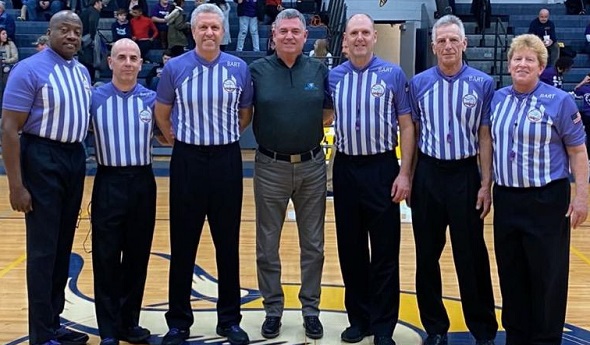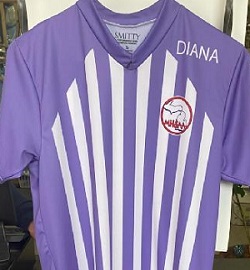
Not Just Another Season for Watson
May 3, 2018
By Cody Porter
NFHS High School Today
A 32-second response by emergency medical technicians was the difference in life or death for 68-year-old Willie Watson, who was spared from becoming another victim of sudden cardiac arrest.
Watson, a 38-year official for the Michigan High School Athletic Association, collapsed in the tunnel near the officials’ locker room after the Division 6 Football Final at Ford Field last Nov. 25 in Detroit. Fortunately for the Kalamazoo native, stadium staff members were steps away as he fell unconscious. Within seconds, their call for help reached on-site EMTs who swiftly made their way to him from the field.
“It was strange because I wasn’t sick or anything. I drove to the game by myself. Everything was fine, got dressed, and then went out on the field for the game,” Watson said. “After the game, I came to the locker room, had a boxed lunch, and the last thing I remember is leaving towards the tunnel. That’s the last thing that I remember. I woke up in the hospital the next day, on Saturday.”
Moments before Watson’s dire situation occurred, he stood in the officials’ locker room speaking with Mark Uyl, the MHSAA assistant director who coordinates officials. Uyl said when he received the call regarding Watson, he arrived to find paramedics administering full CPR, in addition to using an automated external defibrillator (AED).
“It was a scene right out of a movie,” Uyl said.
After about 10 minutes of work on Watson, Uyl said paramedics found a pulse and promptly transported him to Detroit Medical Center.
“Things were very critical that Friday night – very touch and go,” Uyl said. “Overnight we got reports that he was slowly improving.”
An implantable cardioverter defibrillator (ICD) was placed in Watson’s chest. The pager-sized device is battery powered and placed below the skin to monitor heart rate, according to the American Heart Association. If an abnormal heart rhythm is discovered, the ICD delivers an electric shock to restore a normal heartbeat.
“I got to witness an absolute miracle,” Uyl said. “If the cardiac situation doesn’t happen literally at the feet of the medical staff that we have on-site at an event like that, he would’ve gotten up to the concourse or, heaven forbid, outside the building into the parking lot or his car and I believe it would’ve been a much more tragic ending.”
Watson was working the third game of the day as a line judge, and when he collapsed, was beginning to leave the facility and head to a local hotel reserved for MHSAA officials. Uyl told Watson how much of a blessing it was that he was assigned that game. At home or at the hotel, Watson would have been alone without access to proper medical attention.
“Certainly, where we got lucky is where he collapsed,” Uyl said. “We have emergency procedures, but when we’re at one of our college or pro venues, we often use the building’s plan. It could not have been more seamless between our staff and the Ford Field building personnel.”
At MHSAA events, such as those at Ford Field, an ambulance and two EMTs are stationed on the field next to the tunnel that connects it to the other areas of the stadium. Watson said he and fellow officials routinely confirm the location of emergency responders before starting a game.
“Schools almost always have somebody from a university around who does training. Most schools have ambulance service there at the site,” Watson said. “There have been incidences where we have had injuries that require them to come out onto the field to assist a student-athlete. It could be a concussion, a leg injury or who knows. We always have somebody at a venue.”
Equipped with his ICD, Watson left for home a week later from Detroit Medical Center. Expecting to make a full recovery, Watson said the only recommendations from his doctors were to tweak his diet and increase exercise. Although he said his recovery is on track, one of the most notable effects from his incident was memory loss.
“The strange thing is that I cannot remember a single thing about the game. I can’t remember anything,” Watson said. “If you ask me what Ford Field looked like now, I couldn’t tell you. I lost my short-term memory. I remember everything except the game. It’s those 48 minutes that I can’t remember.”
An official in basketball, softball and volleyball as well, staying active won’t be too much of an issue for Watson, who said he took last basketball season off to get himself better prepared for the softball season.
“It’s just amazing how quickly they responded in my situation. Regardless of who it is, the response time I received was tremendous,” Watson said. “I was out. They had to revive me. It only took them 32 seconds to get to me. Even if it’s an injured player on the field, response times are getting so quick.”
PHOTO: Official Willie Watson signals a touchdown during the 2016 MHSAA Division 6 Final at Ford Field.

Haslett Cancer Games Touch Close to Home
By
Rob Kaminski
MHSAA benchmarks editor
February 18, 2020
By Rob Kaminski
MHSAA benchmarks editor
By pure coincidence, it happened to be Valentine's Day.
However, that date on the calendar served as the perfect backdrop when two schools and two officiating crews paired up for a "Coaches for Cancer" girls and boys basketball doubleheader Friday at Haslett High School.
Adding to the poignancy of this particular Feb. 14 were the still-raw emotions for the host school, which lost its longtime principal, Bart Wegenke, to pancreatic cancer a month earlier.
"This is our second year participating in a Coaches vs. Cancer event at a basketball game," said Haslett athletic director Darin Ferguson. "The event was actually planned before Bart’s passing."
Wegenke, 53, was widely recognized in educational circles for his excellence as an administrator, and also was an accomplished basketball official at the high school and collegiate levels, ascending to NCAA Division I status.
During a recent booster club meeting, there was discussion of the event, scheduled for the home doubleheader versus local rival Fowlerville. In attendance was Mike Conlin, whose son Jace is a member of the Haslett golf team. Conlin also assigns basketball officials for the Capital Area Activities Conference and is owner of Correct Call Officiating Outfitters, provider of licensed MHSAA officials apparel.
"They were displaying purple t-shirts that the teams would be wearing that night, and I thought, 'Why not have the officials join in that night?'" Conlin said. "Because of the situation with Bart and his positive influence and the respect given him by players, coaches and officials alike, we had patches created in his memory. So it seemed fitting to outfit the officials for this night with special shirts bearing Bart’s name."
Conlin and partner Joe DeRosa at Smitty Apparel had designed the commemorative patches for collegiate-style shirts that were worn in the Big Ten during a weekend shortly after Wegenke's passing. The shirts differ in style from MHSAA shirts; the area on the shoulder of the collegiate shirt provides greater visibility for the patch.
"I am not an advocate for high school officials wearing college shirts; that's not me," Conlin said. "But, in this case, we got to talking and thought the ragland sleeve would allow for a more prominent display. And, we wanted the shirts to be purple and white so that our crews that night could join in the cause."
Conlin contacted the MHSAA, and permission for the alternate gear – which also would include purple whistles – was granted. Following the games that night, Conlin collected the commemorative shirts to have them dry-cleaned. They were to be given to Bart's brother Brett, who will distribute them to family members.
There was another twist. When Conlin noticed who had been assigned – months before – to officiate the games that night, he decided that one more design would be needed.
 Working the girls game that night were Deb Traxinger, Rob Stanaway and Dennis Bickerstaff. The boys crew was Scott Barnes, Mike Maisner and Justin Terry. It was Terry's name that triggered additional response.
Working the girls game that night were Deb Traxinger, Rob Stanaway and Dennis Bickerstaff. The boys crew was Scott Barnes, Mike Maisner and Justin Terry. It was Terry's name that triggered additional response.
Terry lost his wife, Diana, last May 25 after a courageous fight with cancer.
"When I saw Justin as one of the officials for that night, it just made all the sense in the world to craft a special shirt for him with Diana's name on it since this hits so close to home," Conlin said. "We wanted something for him to take with him."
And Terry did just that, not only following the game, but for the game.
"I'm wearing that shirt for the game," Terry said the morning of the event. "Here it is, Valentine's Day, people exchanging cards, flowers, candy, and for the first time, I don't have that. But I'll be thinking about my honey when I take the floor, and she’ll be with me. My whole family will be there."
And he said he would be thinking of countless others enduring the same struggles his family experienced.
"My heart goes out to the Wegenke family. I know first-hand what it's like to lose the love of your life," Terry said. "I hope for this night to serve as a reminder that people need to be educated about cancer; about regular checkups and warning signs. Whether it's a spouse, child, uncle, aunt, these things creep into our lives and cause us to pause. Every one of us will be subjected to something similar someday. It's important to love hard and live life."
On a date signifying heart, there was plenty of adoration to go around.
PHOTOS: (Top) Mid-Michigan officials wear purple shirts for cancer awareness during Friday’s basketball games at Haslett. From left: Justin Terry, Scott Barnes, Mike Maisner, assigner Mike Conlin, Rob Stanaway, Dennis Bickerstaff and Deb Traxinger. (Middle) Terry wore this shirt honoring his late wife Diana, who died last May after a fight with cancer. (Photos courtesy of Mike Conlin.)

